Community
Katherine Lafourcade — A Journey of Passion, Resilience and Giving Back
Published
1 month agoon
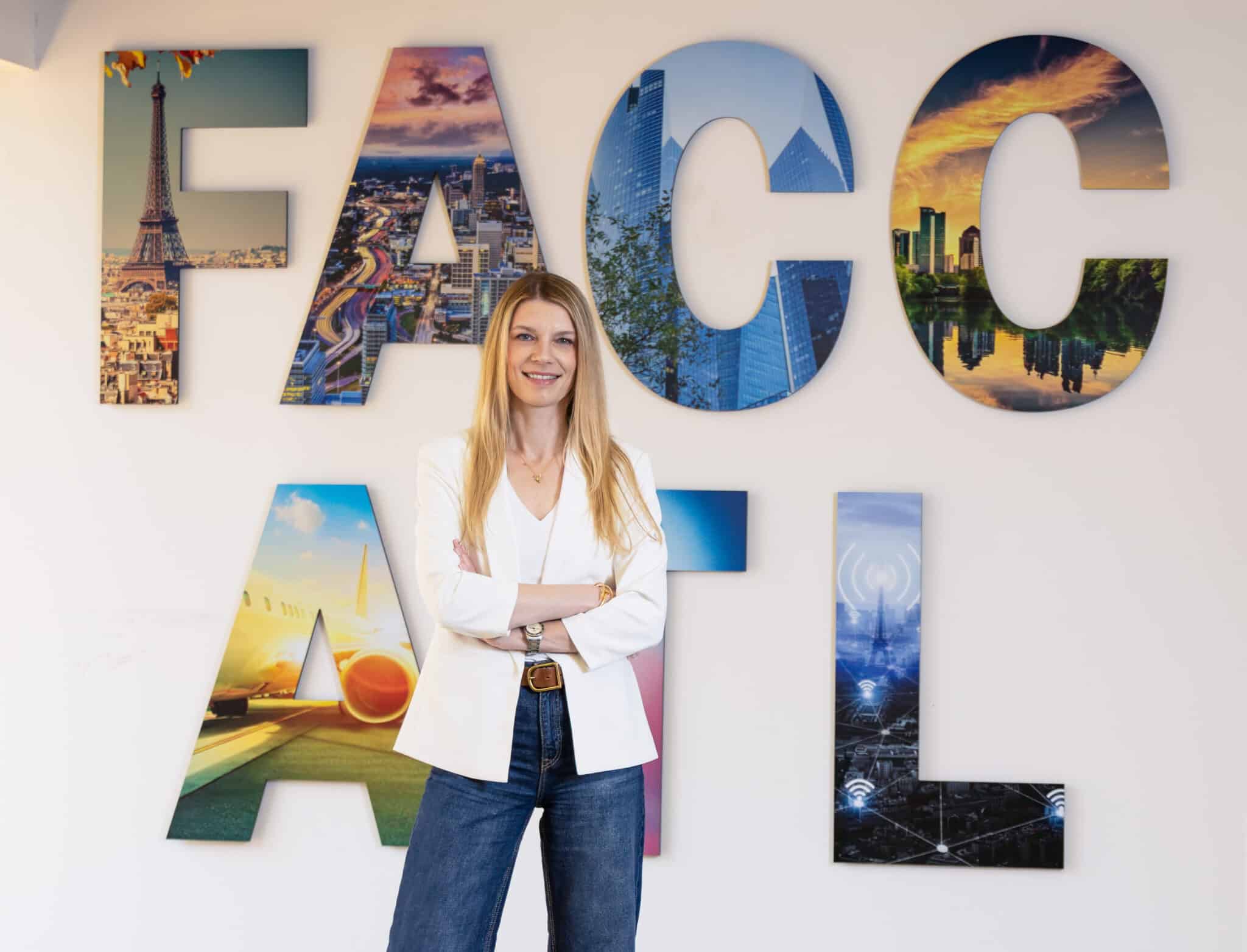
Katherine Lafourcade, executive director of the French American Chamber of Commerce Atlanta-Southeast (FAAC Atlanta-Southeast), located at Curiosity Lab Peachtree Corners, discovered her passion for French early in life.
As a schoolgirl in England, learning French ignited a spark in her. And by age 13 she’d informed her mother that she planned to be bilingual, live in France and marry a Frenchman. Later, armed with a degree in international business and French, she made her way to an internship in Paris, achieved fluency and did, in fact, eventually marry a Frenchman.
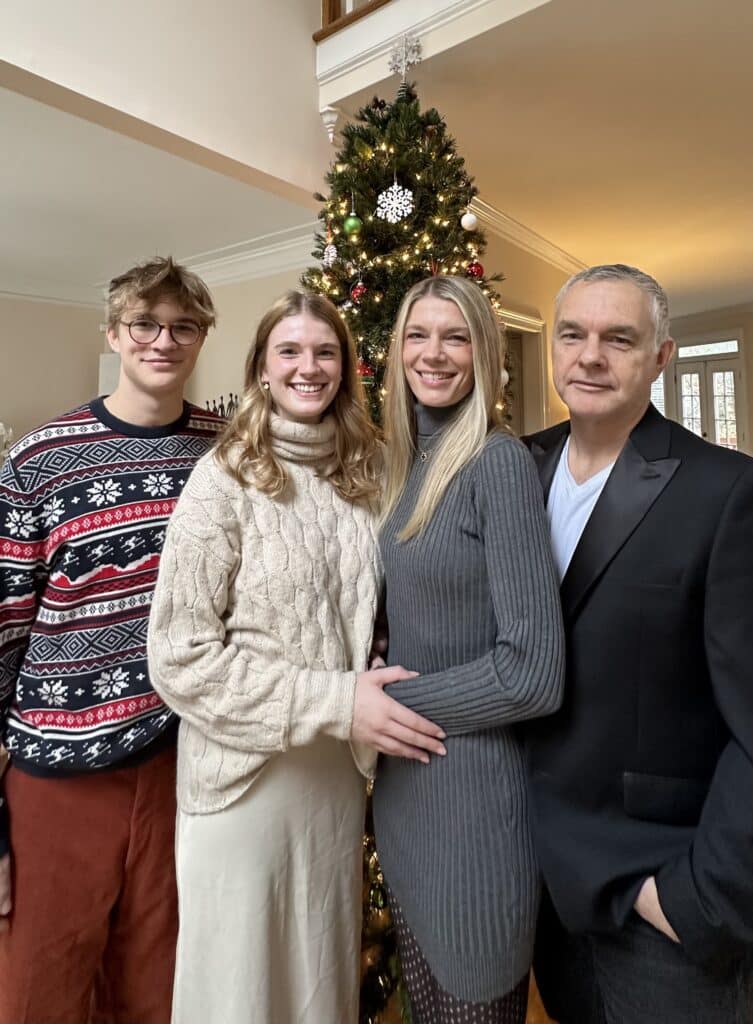
“I worked for 10 months in Paris for a defense company … in the purchasing department. I was basically learning French. I was an assistant, and it was very much French immersion,” Lafourcade recounts.
Having reached an important linguistic milestone, Lafourcade couldn’t wait to share the progress with her mother. “I rang her so excited one day, forgetting she was still teaching. […] They had to get her out of the classroom to come to the phone. All I wanted to tell her was that I’d had a dream in French,” she laughed.
Career moves and motherhood
Lafourcade held various jobs in Paris, then moved to Nantes on the west coast before a new opportunity led her to Geneva. She’d spend more than 15 years in Switzerland. It was there that she met Alain, her Frenchman, and had two children, Lina and Theo.
Balancing motherhood and a career was important to Lafourcade. While initially staying home with her young children, she soon sought a professional outlet.
“For me it was important to show my kids that mums are able to work and have professional roles,” she stated.
Entrepreneur
As women so often do, Lafourcade adapted to meet her family’s needs, but being a stay-at-home mom was not her long-term plan. “I did struggle at that point. […] It was difficult. […],” she confessed.
To work around their circumstances with young children, she and her British biochemist friend co-founded a French/English bilingual preschool, allowing for a business to flourish alongside their children.
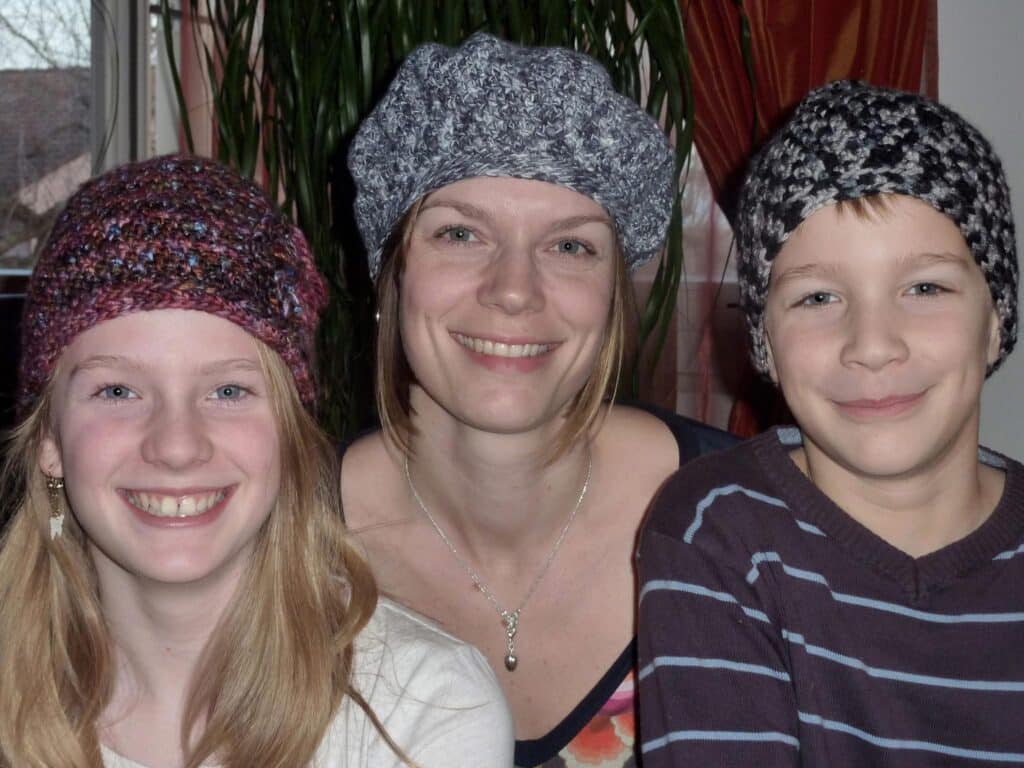
Naysayers suggesting they shouldn’t embark on this venture because they were women, mothers and expats only strengthened their resolve. They ran the successful business for five years, allowing their children to thrive with friends in a nurturing environment.
They secured an employee with early childhood education qualifications. Her friend oversaw the books and finances, and Lafourcade spearheaded communications.
“We were everything — the CEOs and the cleaners,” Lafourcade chuckled.
Once their children were older, the business was sold. Lafourcade then held jobs in recruitment, education (as administrative staff) and manufacturing. Her last job in Switzerland was with Nestlé for five years, serving as an executive assistant to the vice president of Nestlé Skin Health.
As varied as her roles have been, they share a common thread. “In all of my jobs, I’ve always found something where I can use both languages,” she said.
Disaster strikes
In December of 2016, 12-year-old Theo started getting sick. What began with mysterious symptoms like leg and chest pains increased in intensity to the point of tearful nights that landed him in the hospital with a low-grade fever during the family’s trip to the UK in early 2017.
“I’m sure he’ll be fine,” Lafourcade told herself as she spent a milestone birthday in the hospital while Theo underwent a battery of tests. In the meantime, Alain and Lina returned to Switzerland. Lafourcade and Theo stayed behind, hoping for answers that never came.
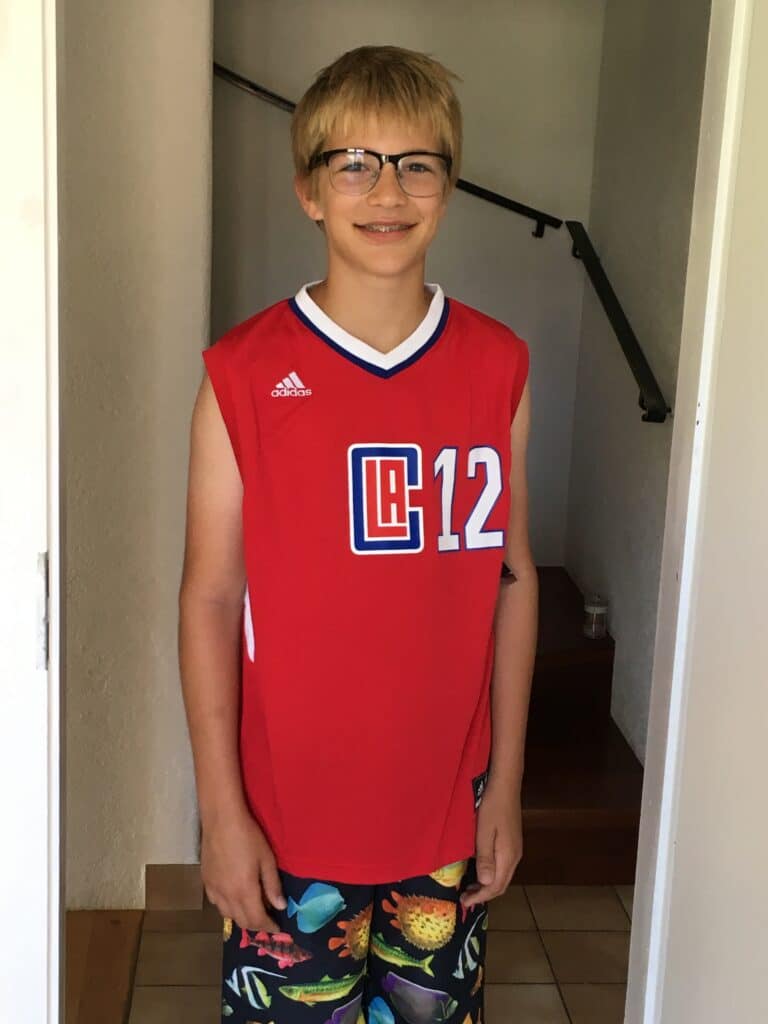
Ultimately, the decision was made to forward all lab results to Theo’s doctor in Switzerland and return home for further investigation. Lafourcade’s sister, a medical professional, reviewed the labs and harbored concerns.
Amidst uncertainty, Lafourcade took Theo, unwell and tired of being poked and prodded, to the pediatrician upon their return.
After cautioning everyone to remain calm, the doctor’s demeanor changed upon feeling Theo’s enlarged spleen, sending them to the hospital immediately.
It’s leukemia
Reliving the trauma, Lafourcade felt the emotions of Friday, January 13, 2017, surface. The diagnosis was acute lymphoblastic leukemia (ALL). Chemotherapy treatments began that same day.
“You don’t get the words that are being said,” Lafourcade confided. “It feels absolutely impossible. This is your healthy, happy, normal kid. How have we gone from that to cancer?”
The port placed in Theo’s chest remained there for the duration of his grueling treatment protocol — over three and a half years.
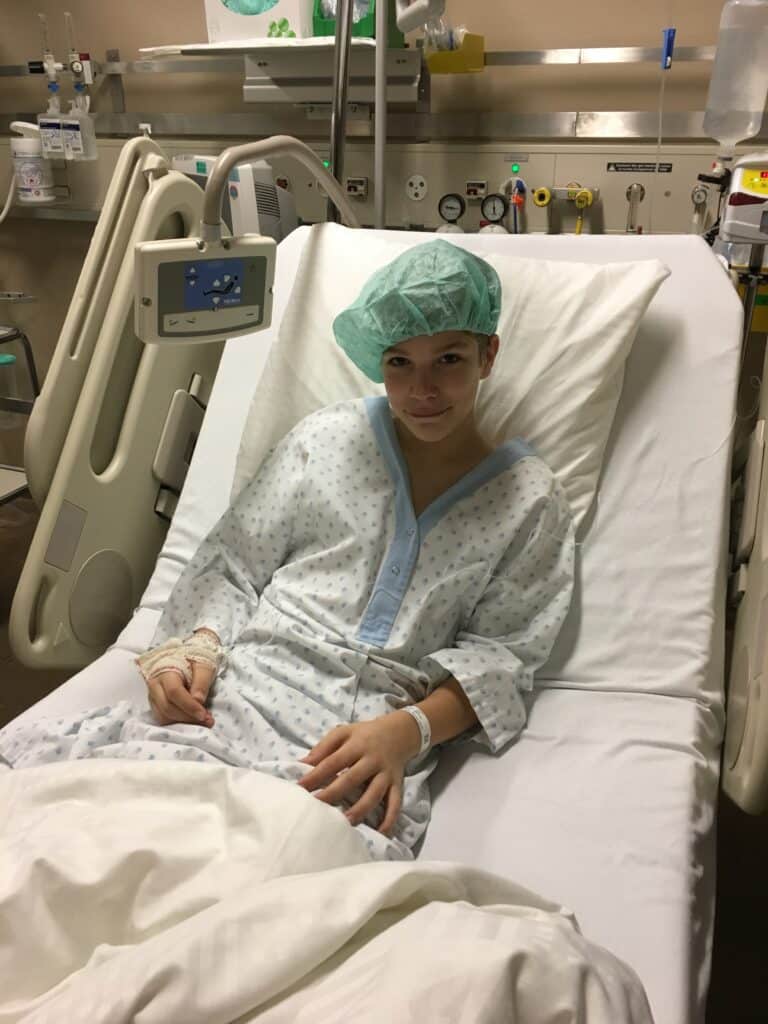
“Leukemia is tough. You learn a lot very quickly because you’re kind of put on this crazy train going 100 miles an hour,” Lafourcade shared.
Leukemia originates in the bone marrow where a single white blood cell undergoes a mutation and multiplies, triggering abnormal growth and division. The proliferation of abnormal cells crowds out healthy white and red blood cells and platelets.
Lafourcade explained, “Normally white cells defend the body. They’re part of your immune system. Once they’ve mutated, they don’t defend anything. They multiply much too fast, and they don’t die quickly enough.”
Phase one
It was the buildup of leukemia cells within Theo’s bones, especially large bones like the sternum and femur, which created massive pressure and pain. Chemotherapy alleviated his discomfort. However, this intensive phase of treatment made school difficult and brought with it all the usual side effects: hair loss, nausea and lethargy.
Lafourcade speaks highly of the care Theo received at the CHUV: Centre Hospitalier Universitaire Vaudois. There, a cocktail of drugs was administered one to four times weekly; some administered into the port, some in a 24-hour drip requiring overnight stays. Others required days of saline pre- and post-hydration to avoid an assault on his organs.
As for Theo’s mood, Lafourcade recalls when he’d had enough. “You have to imagine a 12 and a half, 13-year-old. […] At one point he told me he wanted to die. He said, ‘I don’t want to do this anymore.’ It was horrendous for all of us.”
Constantly in and out of the hospital, Lafourcade was unable to work. Her team at Nestlé took on her workload and checked on her regularly.
When the easy part is hard
Nine months into Theo’s relentless treatment, the Lafourcades anticipated the simpler “maintenance” phase, but things unfortunately took a turn for the worse. Frantic testing revealed an intestinal parasite wreaking havoc on Theo’s already weakened immune system.
There was no rest for mother or son. Lafourcade logged each time he vomited or went to the bathroom — up to 15 times per night. Theo was in agony. When the infection spread to his bloodstream, septicemia took hold. His blood pressure was crashing.
“His lungs got the majority of the infection, so there was not enough oxygen getting from his lungs into his blood system,” Lafourcade explained.
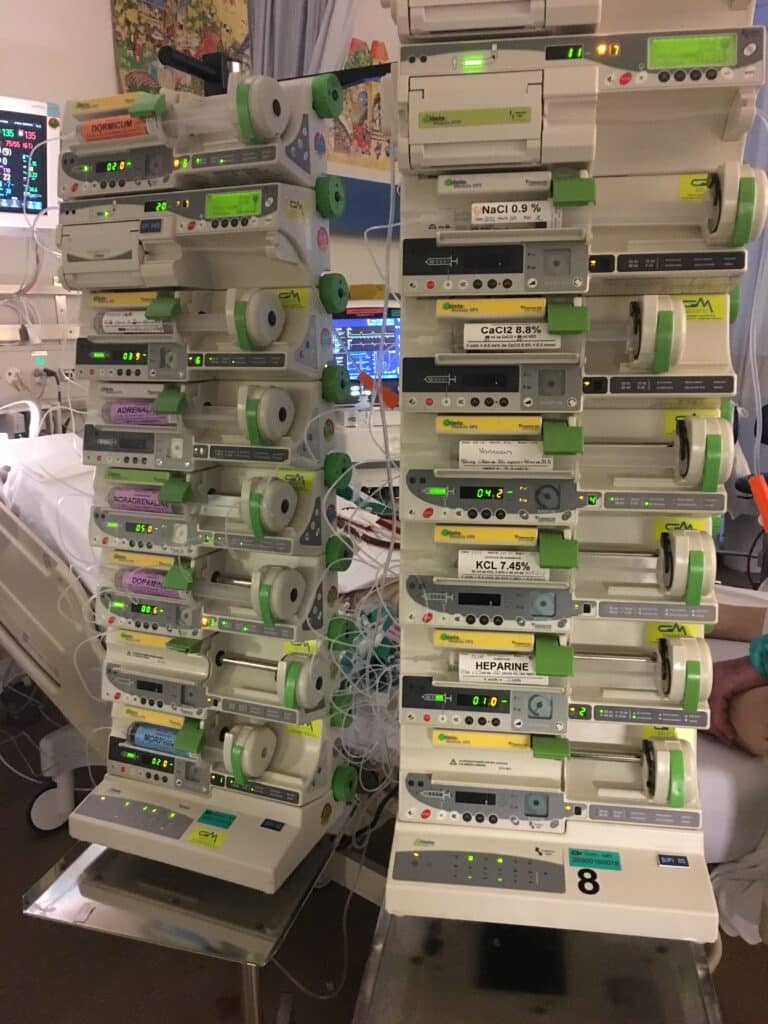
In coma
As a last resort, Theo was placed in a coma and put on extracorporeal membrane oxygenation (ECMO) life support. Mimicking the functions of the heart and lungs, the machine adds oxygen to and removes carbon dioxide from the blood outside of the body and then sends it back into circulation.
“It’s brutal. It’s like open heart surgery. You put two tubes directly onto the heart,” Lafourcade said. At the same time, Theo was on a ventilator for breathing, on dialysis for his failing kidneys and had a tracheotomy to prevent damage to his vocal cords due to extended intubation.
“The machine kept him alive for over three weeks, […] Normally people don’t go on that machine for long because the body is only able to cope with the blood going through this kind of machinery for a short period of time.”
In fact, Theo hemorrhaged multiple times. He needed more blood, fast. Lafourcade recalls doctors sounding an alarm while yelling, “He is empty!” Then she watched as large syringes of blood were injected into tubes connected to his body to boost his blood volume.
A mother’s voice
Having heard that maternal voices can comfort patients and improve their condition, Lafourcade sat by Theo’s side reading to him for the better part of three weeks.
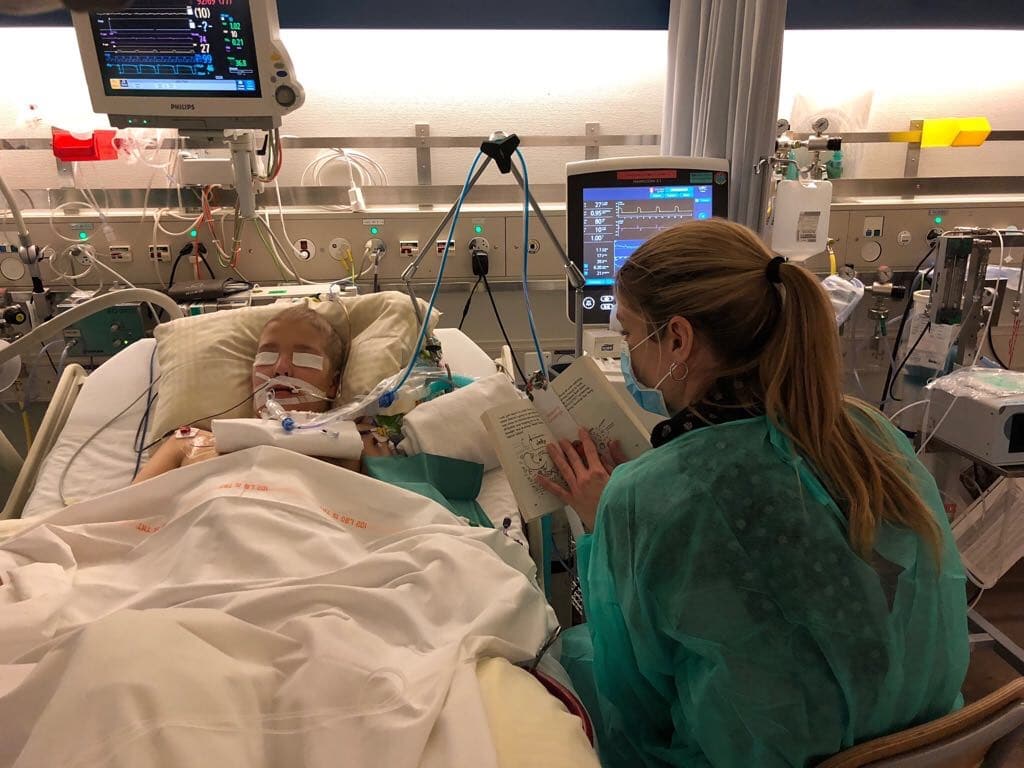
During times when Theo seemed to be “closer to the surface,” his heartrate increased and he exhibited twitching or facial movements. As Lafourcade read to him, she noticed that his agitation would subside.
A rude but astonishing awakening
It was a harrowing decision to take Theo off life support in January. Doctors weren’t sure his heart and lungs could withstand it. He bled profusely, requiring another blood transfusion, but miraculously, he made it.
After nine months of feeling terrible from chemotherapy and being assured it would get easier, he was angry when he woke up. Things were not better.
He’d lost so much muscle mass he could barely sit up. His body was riddled with pressure sores from having been immobile. “He was a little skeleton who couldn’t speak because of the tracheotomy. He was furious. All I could see was this fist by the side of his bed,” Lafourcade recalled.
It took months of daily physiotherapy for Theo to relearn how to sit, stand, walk and grip a pencil.
Coming to America
Just as Theo was transitioning out of the ICU, Alain was offered a position abroad.
“We both said, ‘This feels like something we should look at,’” Lafourcade said. They discussed it with Theo’s doctors first.
They learned that the treatment protocol for leukemia in the U.S. is identical to that of Switzerland. Moreover, his doctors felt the move would benefit Theo psychologically.
The next step was talk to their kids. “I hadn’t even finished my sentence when I was asking Theo, who was 15 at this point and he said, ‘I want to go tomorrow.’”
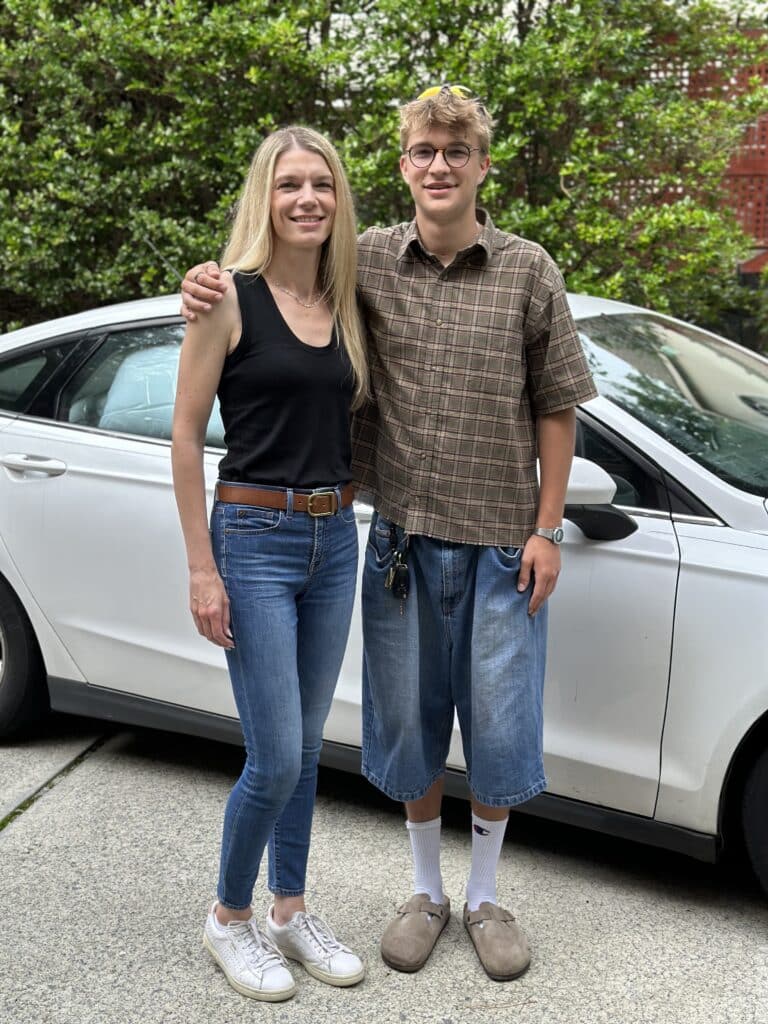
Lafourcade believes it was the ultimate opportunity for him to leave the nightmare behind and start afresh. Unfortunately, Lina was not as enthusiastic about leaving Switzerland during her senior high school year.
In the U.S., Theo continued his treatment at Children’s Healthcare of Atlanta Scottish Rite Hospital. Lafourcade trusted the capable doctors there implicitly. The American doctors simply picked up where their Swiss counterparts had left off.
Theo rang the bell at the end of his treatment in May 2020, making May of this year a particularly important anniversary. After five years, the likelihood of recurrence is significantly lower. Today, Theo is a sophomore at UGA, interested in studying medicine because he wants to give back.
Boss lady and super mom
The Lafourcades joined the FACC Atlanta upon moving to the U.S. to connect with the French community here. At the gala event of 2021 it was announced that the executive director would be returning to Europe. Acquaintances suggested Lafourcade was made for the job.
The position involves speaking French; it instantly sparked her interest. After doing some research about the role, the nature of non-profit organizations and the mission of the chamber, Lafourcade concluded it would be a good fit. She started in January of 2022.
There was some juggling of car rides, study help and college visits. “You have to be clever with the hours you work. The chamber isn’t a [traditional] 9-to-5. There’s a lot of afterwork stuff. It can be a fairly unusual time frame that I work within, especially with France, you’ve got the six hour time difference,” Lafourcade shared.
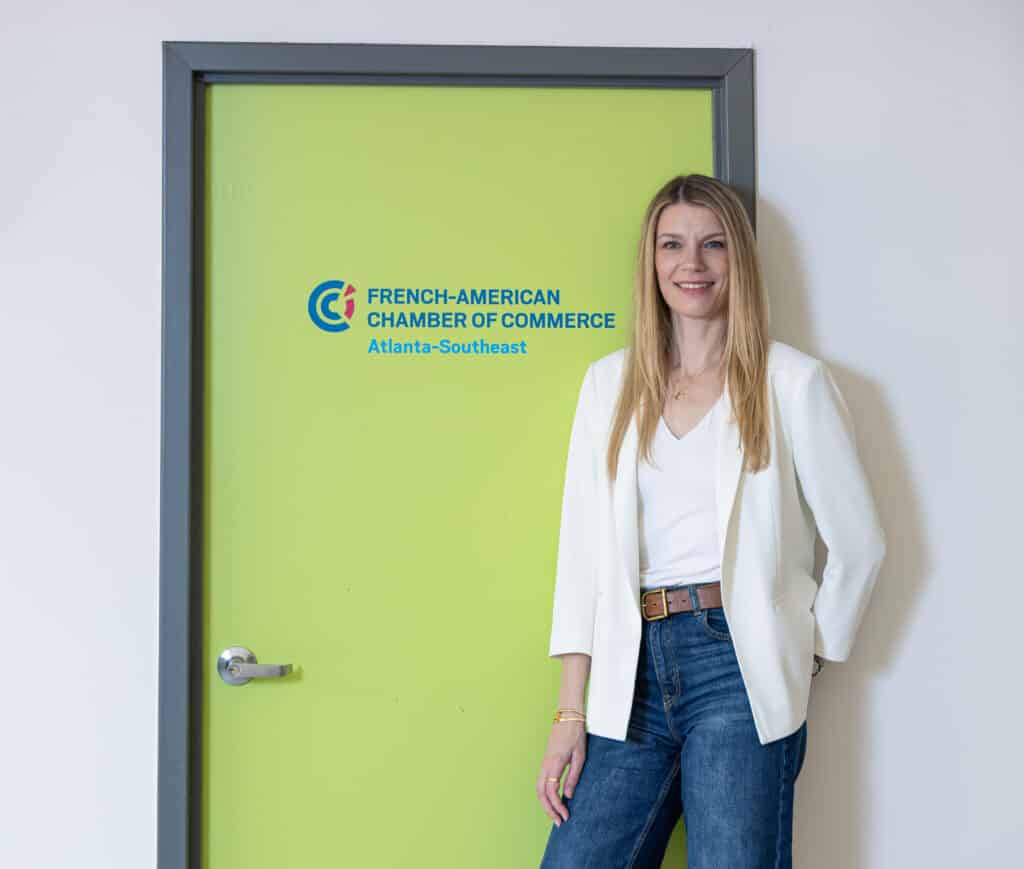
She considers herself lucky to have more flexibility than she would in a typical office environment. Some days are long, but her children see the value in what she does, and that motivates Lafourcade.
Her vision is for the chamber to be the “go-to” for any French companies here, all Francophiles in Atlanta and any French companies moving in. She collaborates closely with The Alliance Française and the French Consulate to support the vibrant French community in metro Atlanta.
According to Lafourcade, board members have noted the chamber’s improved position under her leadership over the past three years.
The FACC Atlanta-Southeast was founded in 1985. After highs, lows and multiple changes, they celebrated 40 years this past February. “We’re looking to go onward and upward,” Lafourcade smiled.
Despite talks of tariffs creating challenges, the FACC’s mission remains the same: to provide a soft landing for French companies establishing themselves in the region.
The floodgates open
In May 2022, a significant change occurred: the Food and Drug Administration lifted the “mad cow” (variant Creutzfeldt-Jakob disease) restrictions on blood donation for people who had lived or traveled in the United Kingdom, France and Ireland from 1980 onward. The Lafourcades were delighted; they were finally eligible to donate.
“It’s the notion of giving back, it’s community, it’s people in need,” Lafourcade said. “I never thought that I would be in a situation where anonymous blood donors would save my son’s life. And yet, that’s what happened.”
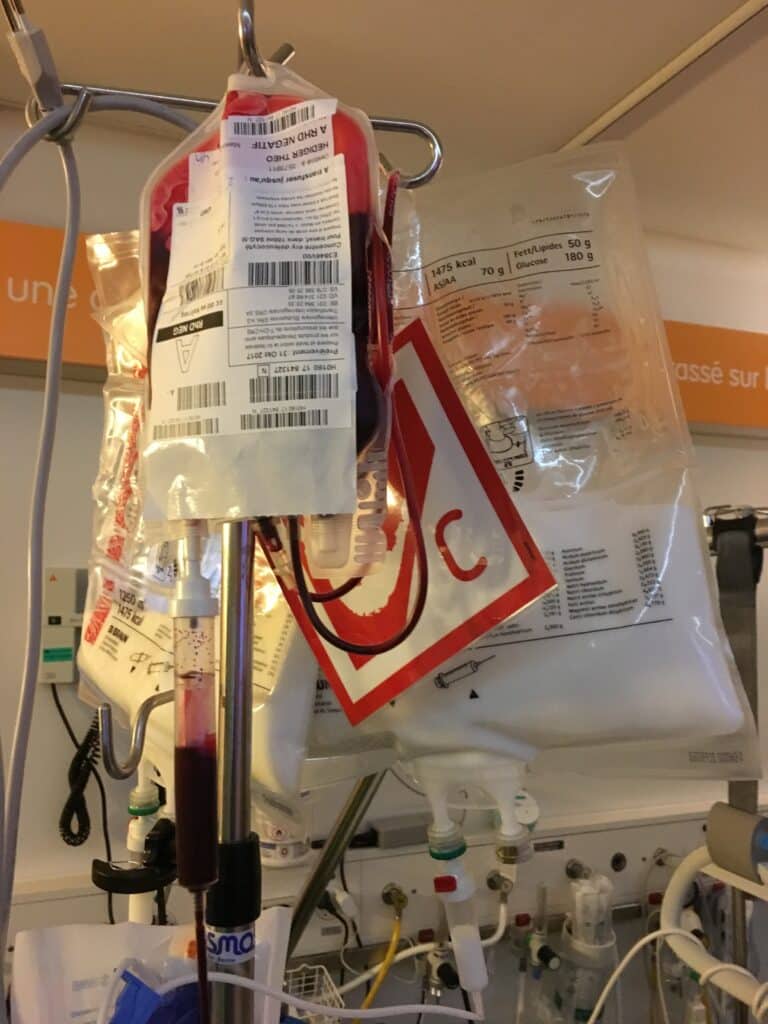
Although it may be human nature to think this type of misfortune only befalls others, Lafourcade feels we must ask ourselves, “What if one day it’s you or your child?” Because human blood can’t be manufactured, we’ll always depend on people’s generosity for it.
Initially, she alerted members of the FACC Atlanta that the rules of blood donation had changed for them. “I’m going to use my voice as the leader of the chamber to get the word out. One side of it is the expat community. Another side is people stopped donating during COVID and haven’t gotten back to it,” she shared.
Lafourcade believes her story can serve to strengthen a sense of community, particularly in a world feeling increasingly uncertain. “We’re in such a weird world right now where everything is scary, and people don’t know what the future holds,” she said.

She focuses on tangible actions people can take to quell that dreadful feeling of helplessness. And, having been on the receiving end of this life-saving practice, she wishes to inspire others to donate.
“Giving blood is free! You can do it several times a year and you will for a fact be helping somebody. It’s a case of helping your neighbor and doing something good if you can.”
Raising awareness
Turning trauma into positive action, Lafourcade feels a sense of duty to host blood drives. My husband and I were donors at her first one last September.
It was a painless, streamlined process. Snacks and refreshments were generously provided. Meeting community members and greeting Lafourcade were perks.
“The first one that you came to … we did a great job. Our goal for the drive was 18 units and we smashed that, we got 34 units,” Lafourcade beamed.
To spread the word beyond the FACC, she is now reaching out to the communities in which she lives and works — Johns Creek and Peachtree Corners respectively — to share her experience and encourage participation.
World Blood Donor Day
Lafourcade is hosting her next Red Cross Blood Drive at Curiosity Lab on World Blood Donor Day, Saturday, June 14, from 11:30 a.m. to 4:30 p.m., and encourages residents to help in whatever way they can.
“I want everybody in Peachtree Corners thinking, ‘I want to do my part.’ If people can’t give blood they can volunteer or help spread the word,” she said.
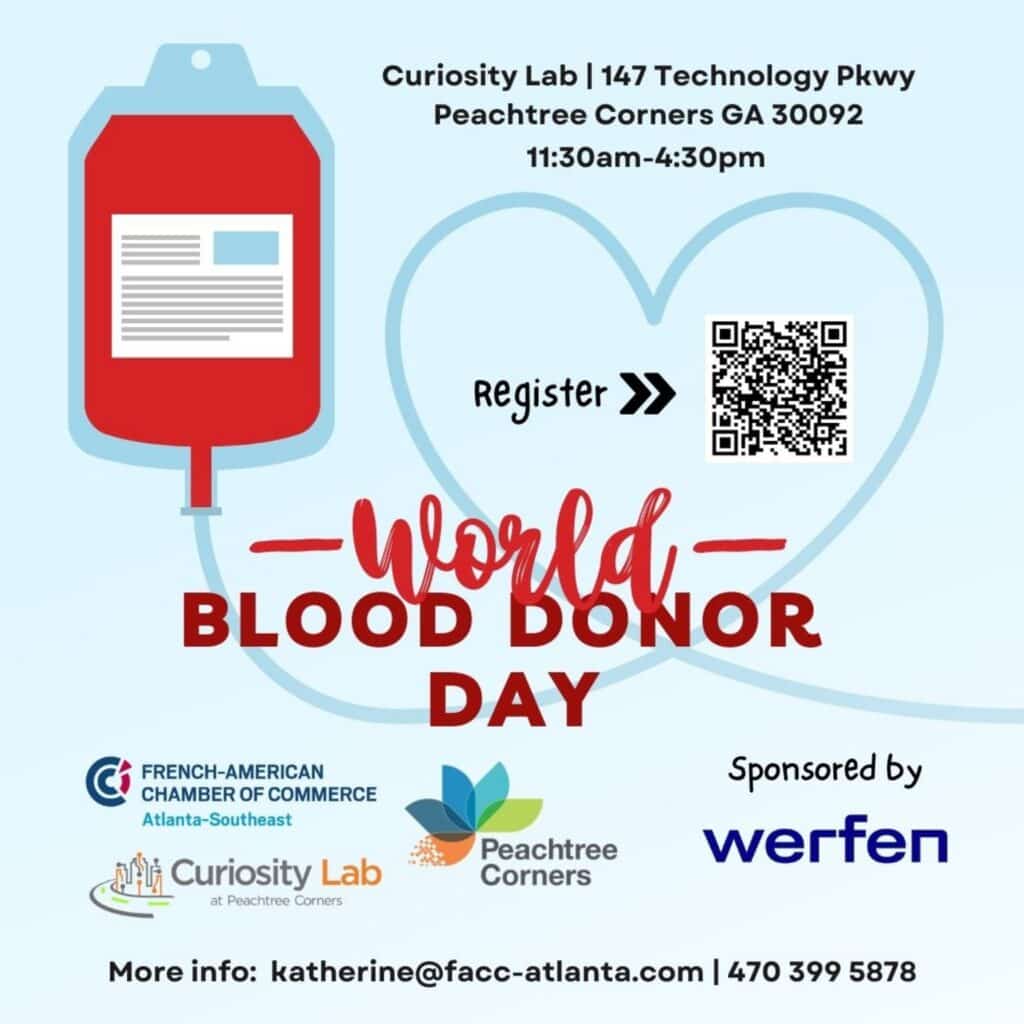
You can sign up to donate on the FACC Atlanta website or download the American Red Cross Blood Donor app to schedule and manage appointments and follow your blood’s journey to see where it gets used.
A woman in leadership
Katherine Lafourcade — executive director of the French American Chamber of Commerce Atlanta–Southeast, a passionate advocate for cultural and business exchange and a resilient mother — has journeyed from a schoolgirl captivated by the French language to leading a prominent bi-national organization.
Her story is one of determination, adaptability and turning profound personal challenges into a powerful force for good.
For more about the FACC Atlanta-Southeast or to sign up for the June blood drive, visit facc-atlanta.com. You can also connect with the organization on LinkedIn.
Related
Patrizia hails from Toronto, Canada where she earned an Honors B.A. in French and Italian studies at York University, and a B.Ed. at the University of Toronto. This trilingual former French teacher has called Georgia home since 1998. She and her family have enjoyed living, working and playing in Peachtree Corners since 2013.

Community
Peachtree Corners Festival Awards Debbie Mason Drama Scholarship for 2025
Published
1 week agoon
June 2, 2025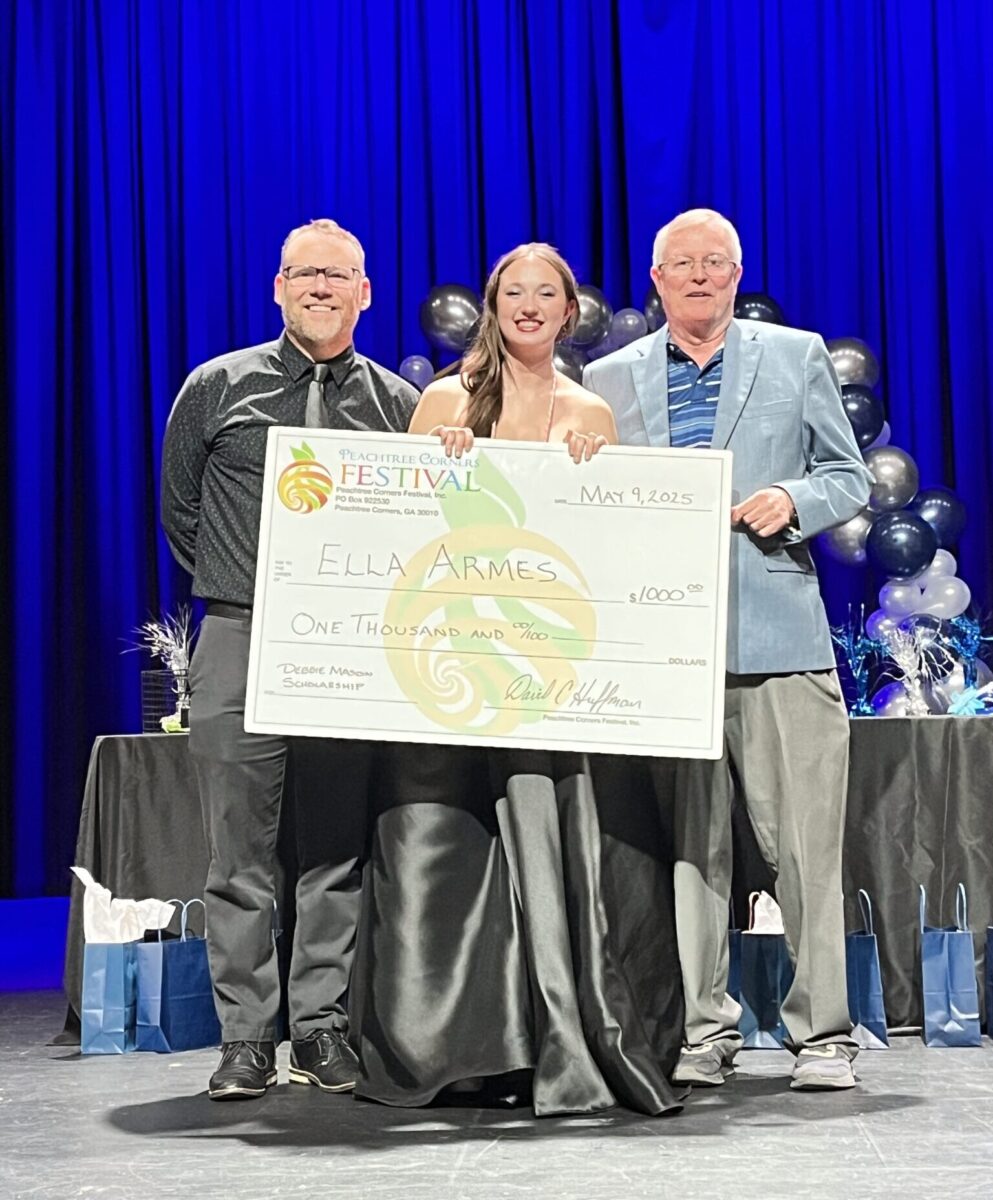
On May 9, the Peachtree Corners Festival awarded the Debbie Mason Memorial Scholarship for Drama to an outstanding Norcross High School drama senior. The recipient was Elizabeth “Ella” Armes, a student who has been involved in the Norcross High School drama department for four years and was most recently the primary stage manager directing the high school’s performances.
According to Terry Gabbard, director of theater at Norcross High School, Ella “was vital to the success of our program. She is an incredible young lady who will be continuing her studies in media and the arts in college.”
In fact, Ella plans to continue her education and work in theater and communications at Kennesaw State University starting this fall.
This marks the third year that the Peachtree Corners Festival has awarded the drama scholarship in the name of the late Peachtree Corners Festival co-founder, Debbie Mason.
In addition to being the first “First Lady” of the city of Peachtree Corners, Debbie and her family were long-time supporters of the drama program at Norcross High School. After her passing in 2023, the Peachtree Corners Festival established the Debbie Mason Memorial Scholarship for Drama as an appropriate way to honor her legacy.
About the Peachtree Corners Festival
The Peachtree Corners Festival is a non-profit, 501(c)(3) volunteer organization dedicated to bringing a safe, wholesome and family-friendly festival to the city of Peachtree Corners each year.
The organization’s goal is to foster community pride and civic involvement, not just through the weekend-long festival, but by giving back and supporting education and beautification initiatives within the city and recognizing deserving members of the community.
This year’s Peachtree Corners Festival will take place on the Town Green, September 20–21.
For more information, visit peachtreecornersfestival.com.
Related
Community
The PCBA Awards $500 to Light Up The Corners at After-Hours Event
Published
2 weeks agoon
May 28, 2025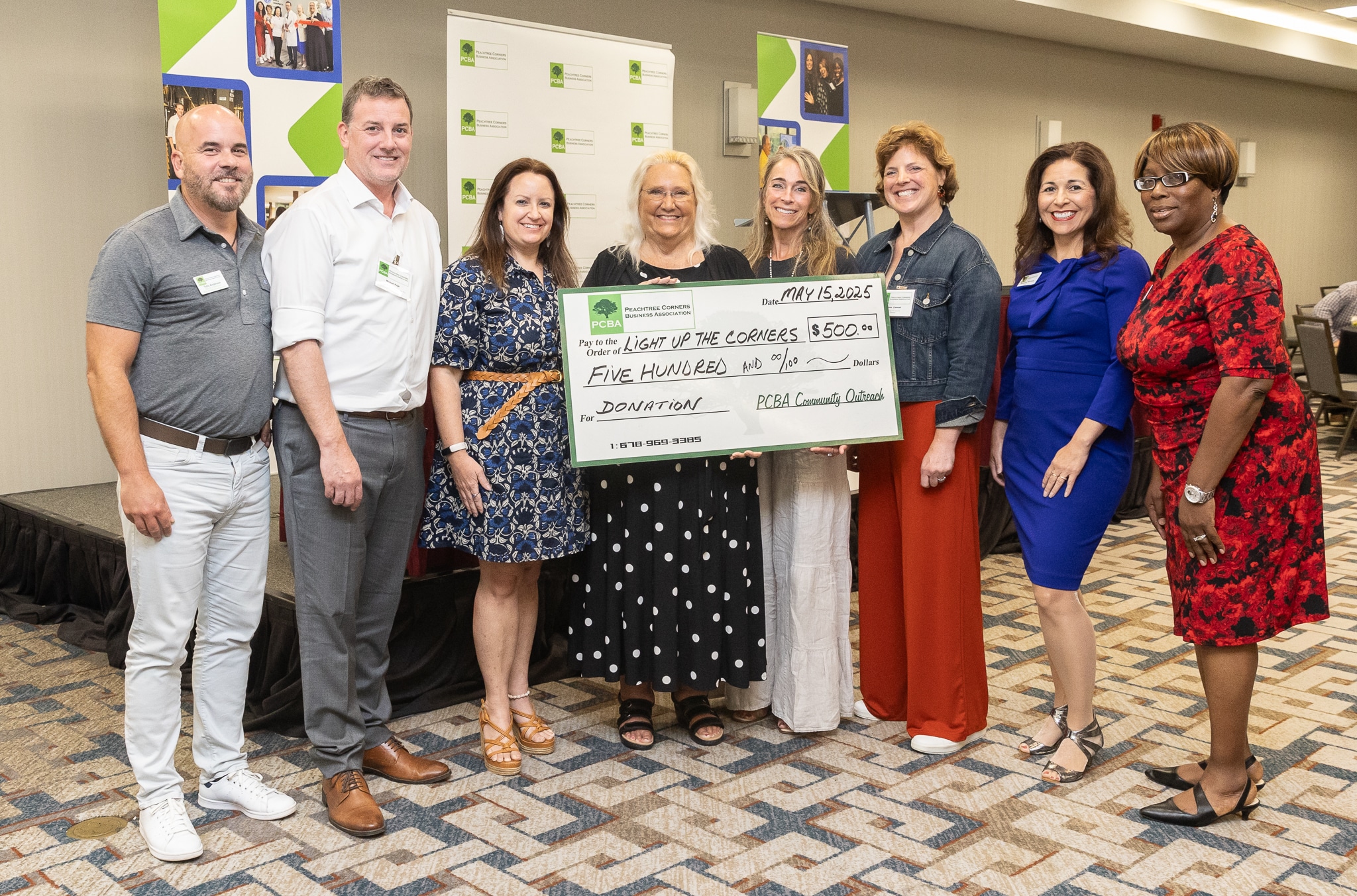
The Peachtree Corners Business Association (PCBA) awarded a check for $500 to Light Up the Corners at their May 2025 Business After Hours event.
Light Up the Corners, a 501 (c)(3) nonprofit, organizes the annual Glow Run and Twilight Trot — a nighttime, community celebration that’s equal parts race, fun run, party and fundraiser.
This year’s event is scheduled for Saturday, August 16 at The Forum in Peachtree Corners. The 1K Twilight Trot will start at 8 p.m., and the four-mile Glow Run will begin at 8:30 p.m. After the runners have crossed the finish line, a fun, post-race party will follow.
All proceeds from the Light Up the Corners event go to benefit less fortunate children and families in the community by giving them the chance to participate in life-enhancing programs and activities at the Fowler YMCA.
A history of charitable donations
PCBA’s donation to Light Up the Corners will help the organization meet its goal of assisting struggling families through their Why It Matters campaign. It’s the latest in a series of donations that PCBA has made over the years through their community outreach program.
“We are so proud that the PCBA has awarded 20 scholarships to outstanding future business leaders and donated in excess of $173,500 into our metro Atlanta community over the last 13 years,” said Lisa Proctor, PCBA board president.
Funds for PCBA’s community outreach program are raised throughout the year from PCBA membership, sponsorships and Tailgates and Touchdowns, an annual charity event they hold each August. Donations and scholarships are awarded at their Business After Hours events so that their members have the opportunity to learn more about the community organizations.
About Peachtree Corners Business Association
The Peachtree Corners Business Association is a business membership organization that focuses on innovative approaches, programs, shared resources, community outreach and opportunities for member businesses and professionals to connect, develop, grow and prosper.
The PCBA is made up of businesses of all sizes and types that want to expand their reach and grow their business within Peachtree Corners and the greater metro Atlanta area.
For more information call 678-969-3385, email membership@peachtreecornersba.com or visit peachtreecornersba.com.
Related

Annual multi-genre convention celebrating Japanese anime, American animation, comics and gaming sets new record with 59,222 attendees
— Article updated May 29, 2025
Atlanta welcomed nearly 60,000 fans of cosplay, comics, gaming, anime and music over the four-day Memorial Day weekend — all meeting up at the Georgia World Congress Center to celebrate MomoCon 2025 and its 20th year in the city.
One of the fastest growing, all-ages conventions in the country, this year’s numbers topped the 56,000 guests that attended in 2024, and was estimated by the Atlanta Convention & Visitors Bureau to have a $42.2 million impact on the metro area.

Equally important, the buzzing enthusiasm and pure joy of the weekend, from both attendees and featured guests, was unmatched. Everyone seemed to be having an incredible time. And plans are already in the works for an even more impressive — and expanded — MomoCon experience in 2026.
Organizers say they are expanding into both Hall A and Hall B next year, increasing the total space to a massive 1,045,178 square feet for exhibits and gaming. The team is already hard at work planning amazing new guests and activities for MomoCon’s 21st year.
Registration for next year’s event is already open, with early-bird discounts for fans who want to lock their passes in early.
Giving back to the community
In addition to the money brought into the city and to the convention itself, MomoCon chooses a charity each year in which to support with donations. Funds are raised through sales of specialty merchandise and custom events that have donation elements built in.

The 2025 official charity was the Johnson STEM Activity Center. MomoCon raised more than $5,000 for the center and contributed an additional $7,500 in matching funds, bringing the total donation to $12,500. MomoCon organizers also worked with 11 Atlanta-area, youth-serving nonprofits to give back by bringing more than 900 kids in need to the convention.
Nonprofits receiving tickets this year included Scouting America, Horizons Atlanta, ReImagine ATL, the New Media Education Foundation of Georgia, Purpose Possible, Lekotek, Focus, Boys & Girls Clubs of Metro Atlanta, Big Brothers Big Sisters of Atlanta, Wellroot Family Services and the YMCA.
Fan-favorite comic book artists
Comic book artists (and original members of the former Atlanta-based Gaijin Studios), Cully Hamner and Brian Stelfreeze made their first appearances at MomoCon this year, invited to attend and show off their work in the Artist Alley.
Fans lined up to meet them, along with fellow award-winning artist and longtime friend, Wade von Grawbadger, to get photos, autographs and artwork and spend a few minutes chatting with the guys.
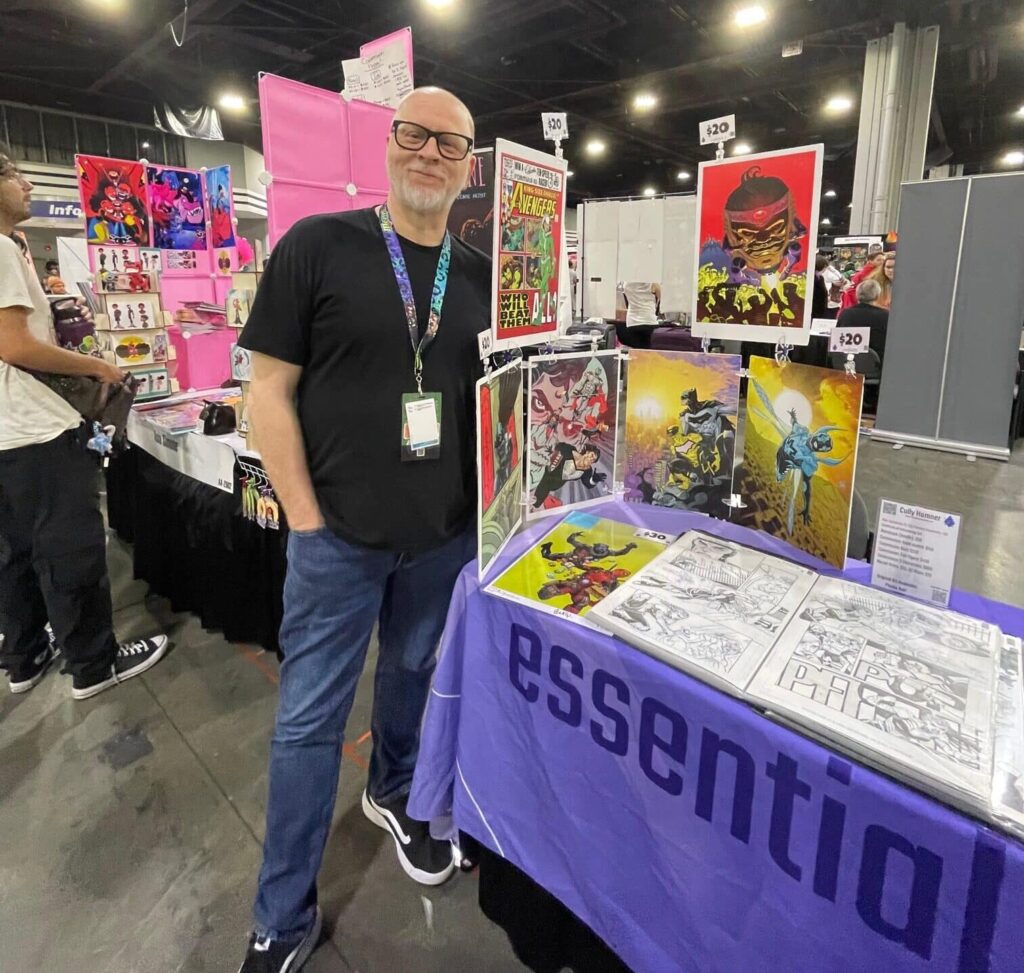
Hamner talked briefly about an upcoming project, “Ruby Actual” that he’s doing with Greg Rucka. “Not sure when it will come out,” he said, “But we’re hoping first quarter 2026.”
In the meantime, comic fans can continue to enjoy his previous work — the acclaimed, creator-owned RED (which was adapted into two films), the current Blue Beetle (also adapted to film) and all of the other work he’s done for DC, Marvel and other publishers over the last 30 years.
They can also look forward to his return to MomoCon in the future if schedules work out.
“This has been a lot of fun,” Hamner said on Sunday, the last day of the convention. “I’d love to come back if they invite me again.”
Stelfreeze agreed. “I enjoyed [MomoCon],” he said. “I really liked seeing the younger audience.”


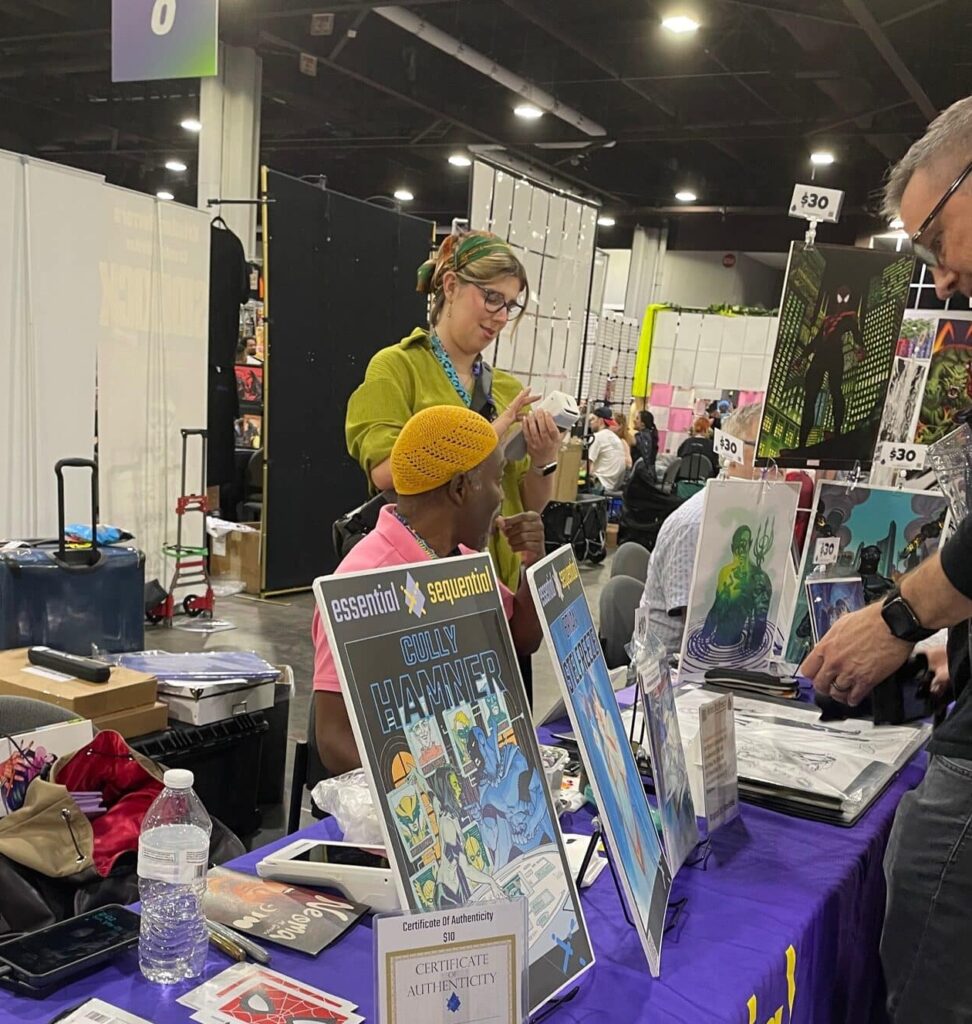
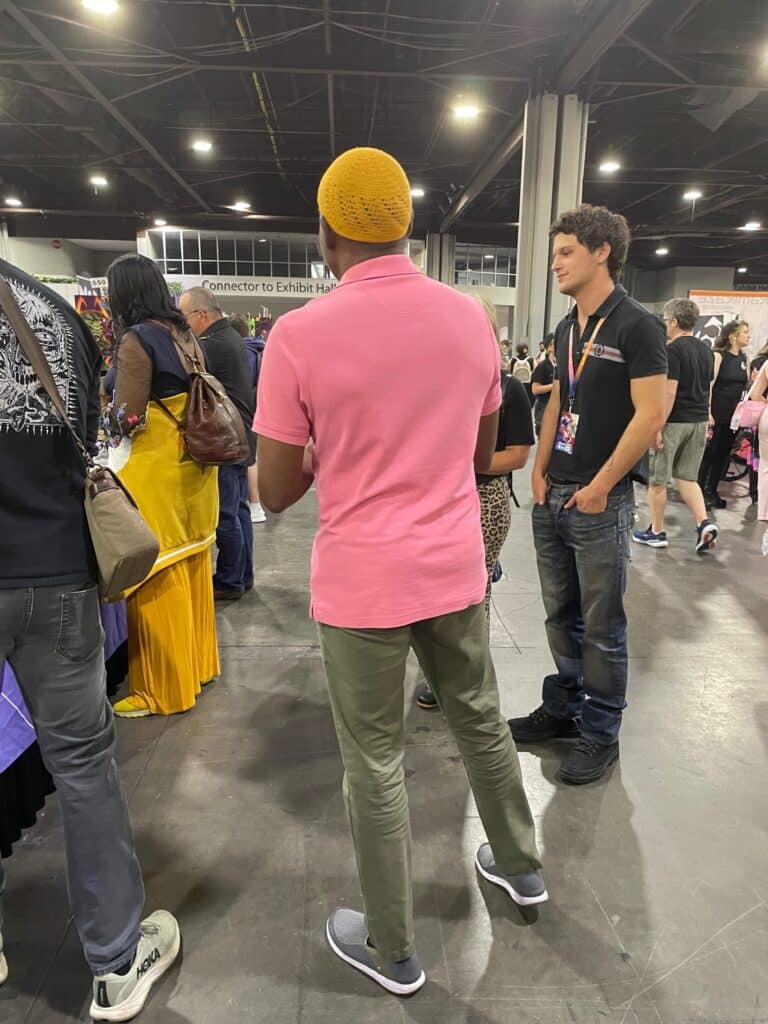
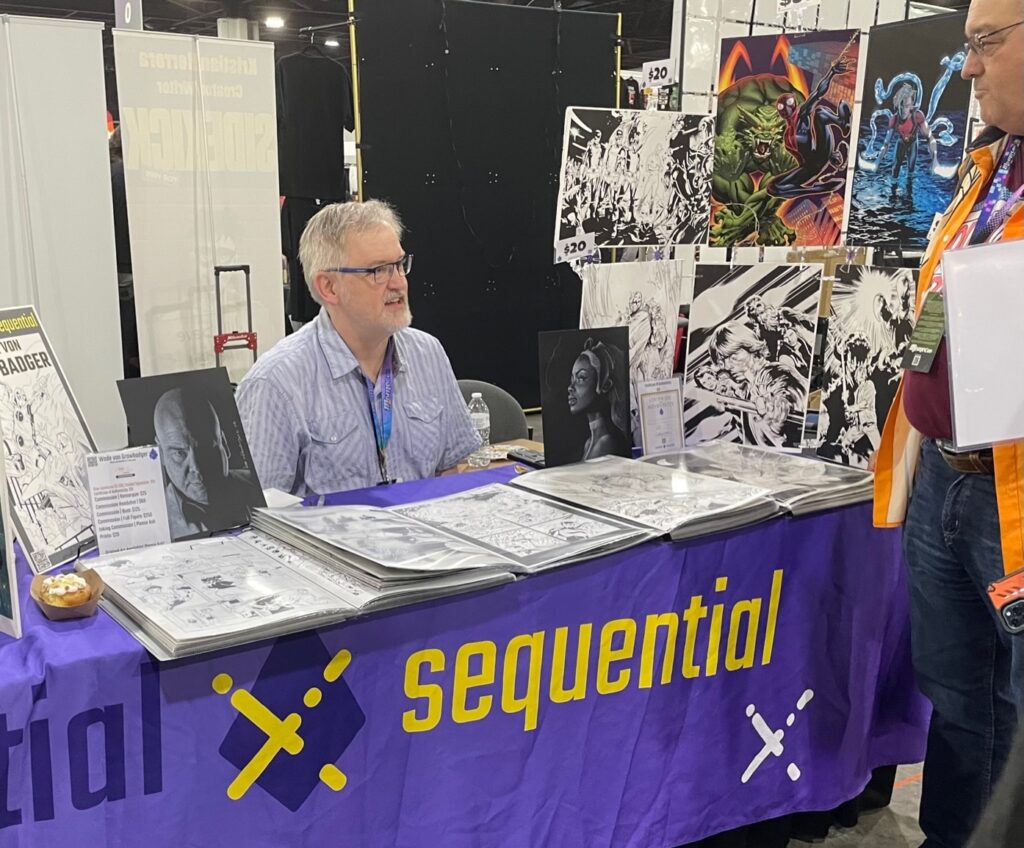
That definitely seemed true on Sunday, as the crowds had thinned out some and Stelfreeze had more time to hang out and talk with people who stopped by the Essential Sequential booth. With some fans, he spent ten minutes or more discussing art, comics and other topics, and even came out from behind the table at times to meet people and say hi to old friends.
Featured guests
Other featured guests also drew long lines of fans who were eager to meet their favorite creators.
Darryl McDaniels (from RunDMC and now a comic book and children’s book author), Greg Burnham (Norcross-based comic book writer known for his indie comic hits), Reed Shannon and Mick Wingert (voice actors and stars of Netflix’s “Arcane”), Ryō Horikawa (Japanese voice of Vegeta in “Dragon Ball Z”), veteran voice actor and producer, Chris Sabat, and online personalities such as Damien Haas were just a few of the standouts.
In fact, as the convention was winding down on Sunday afternoon, Haas’ fan line was still so long, the crowd filled multiple rows of the cordoned-off autograph area, both inside and outside of his designated line.
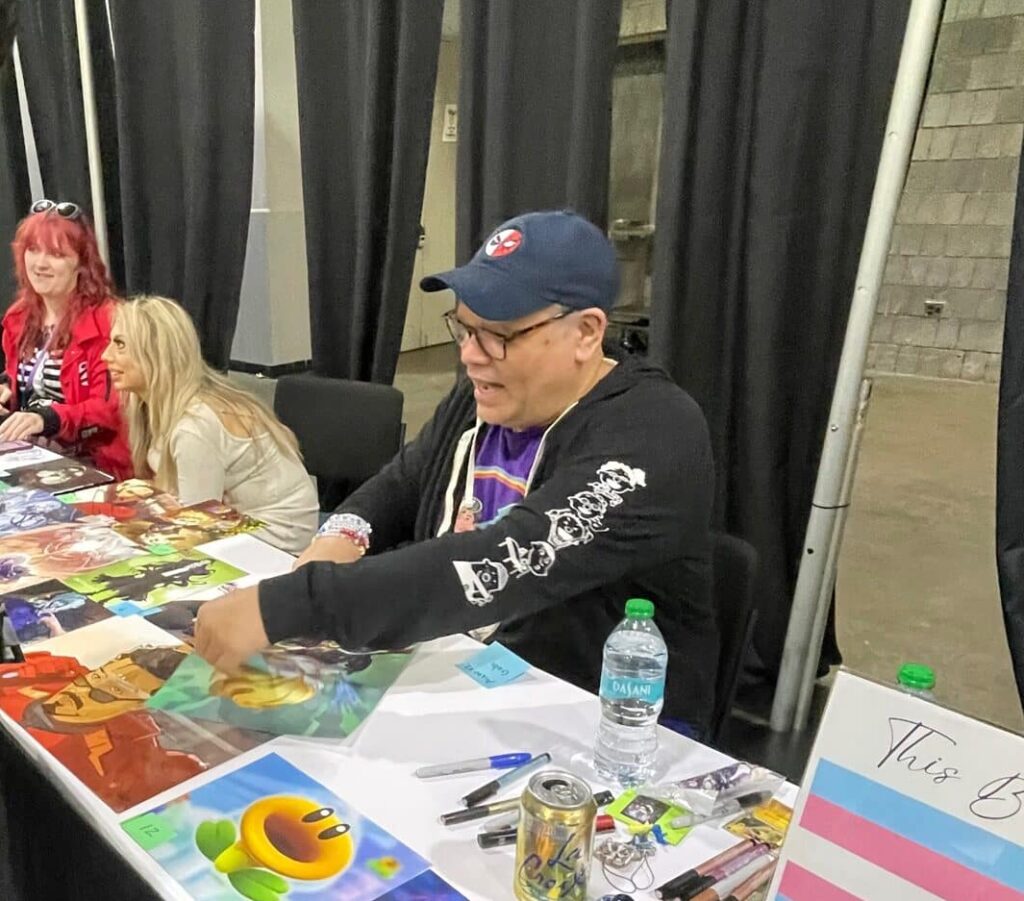
A full list of 2025 celebrity guests can be found here.
New for 2025
While most of the fun features of MomoCon 2025 were returning favorites — Artist Alley, Exhibitor’s Hall, panels, movie screenings and the cosplay showcase —convention organizers kept things fresh with a new theme (‘90s Retro) and a few new highlights, including a skating rink, an expanded online gaming area and the return of the“Bring Your Own Computer” space.
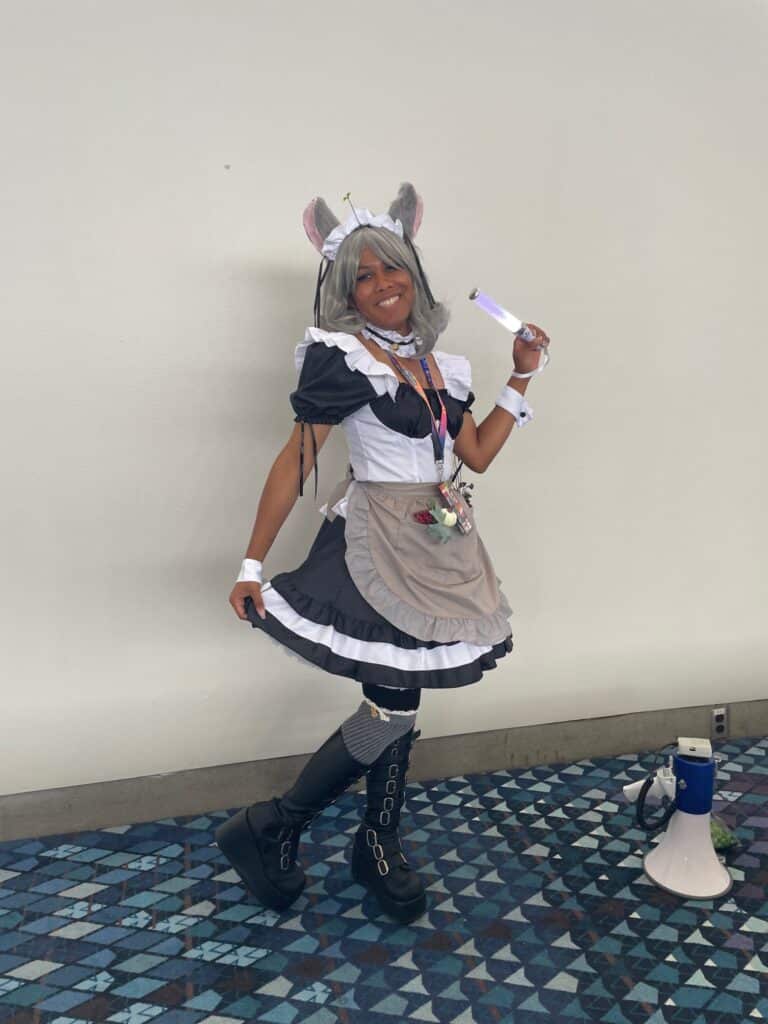
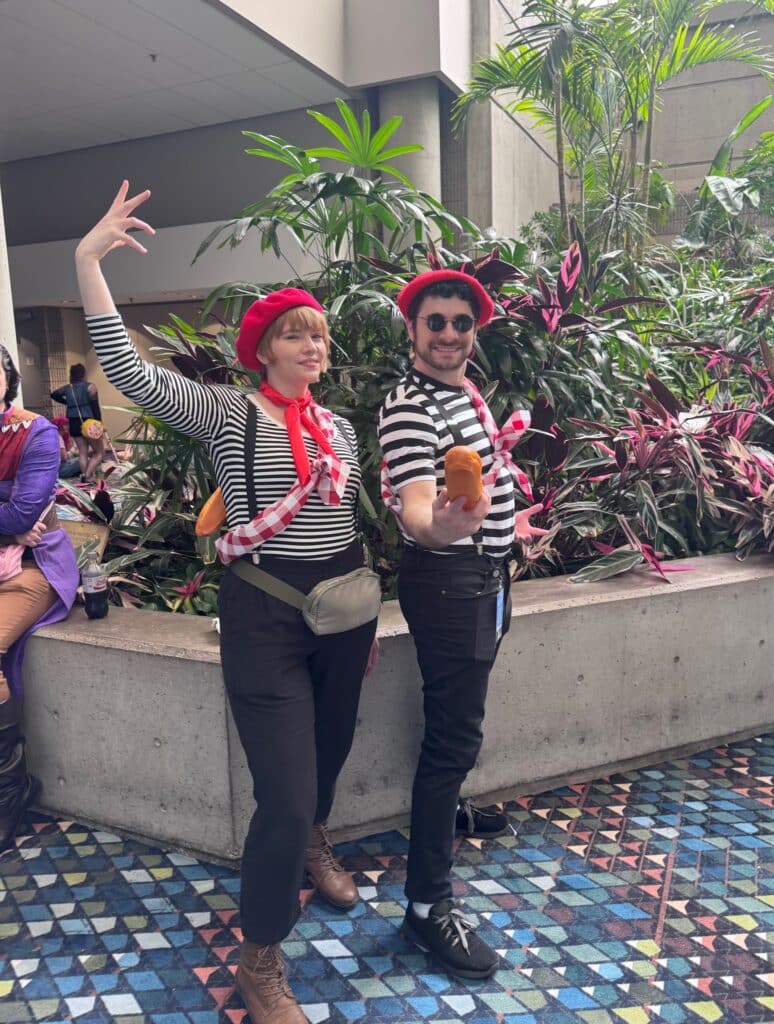
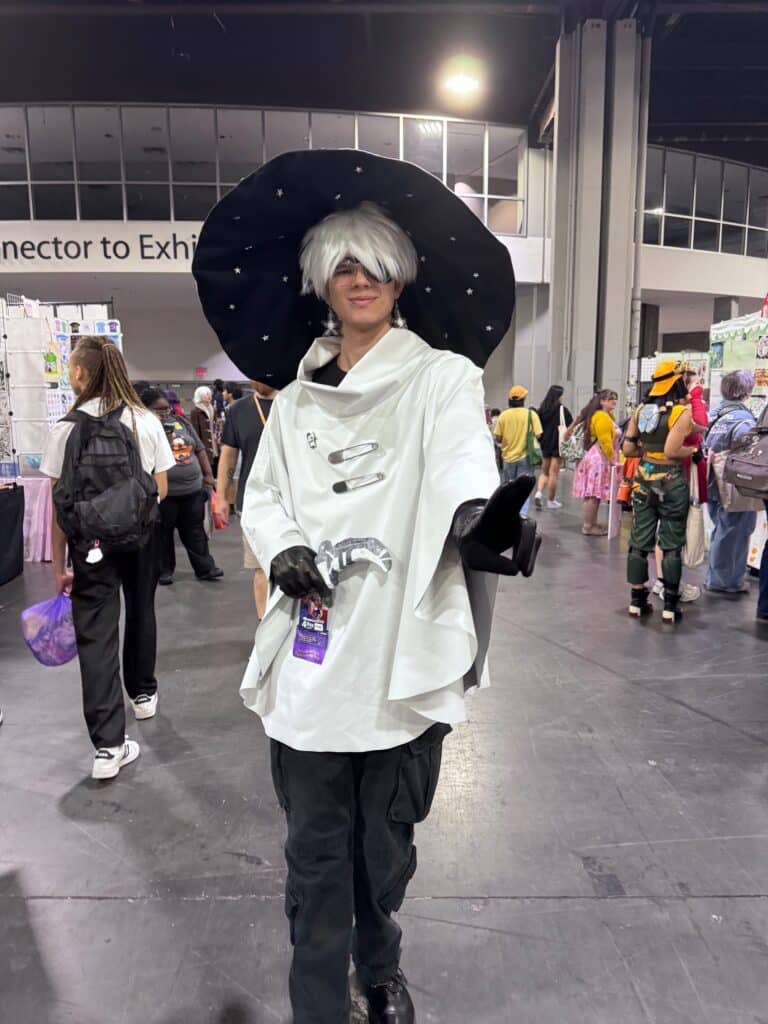

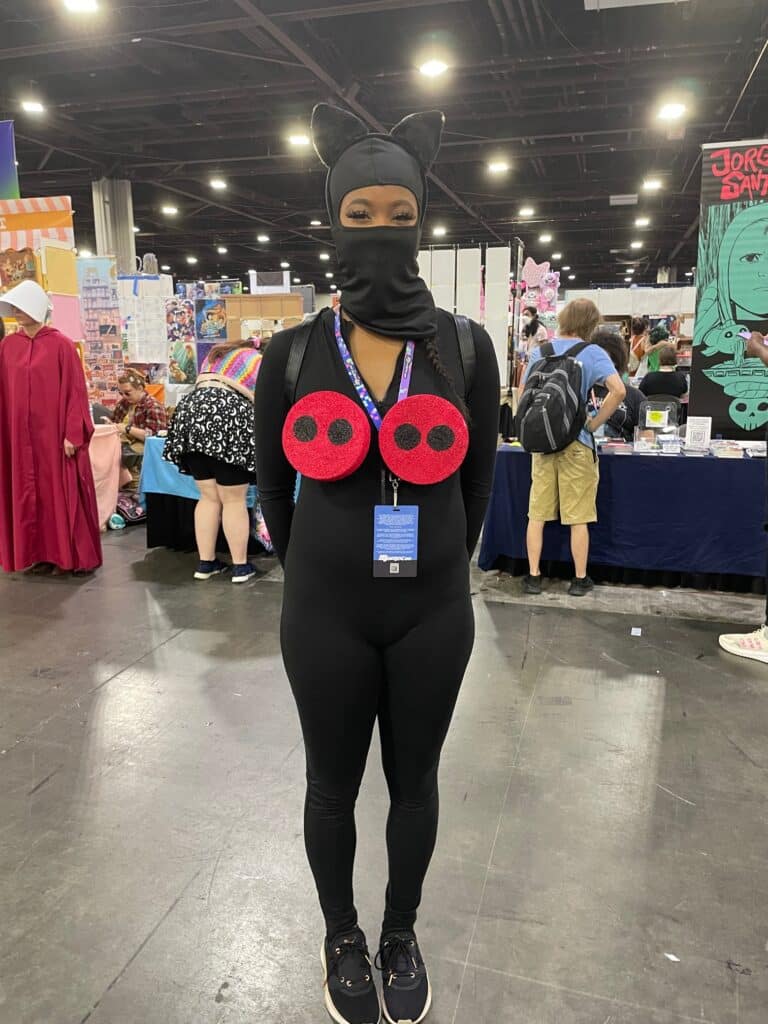
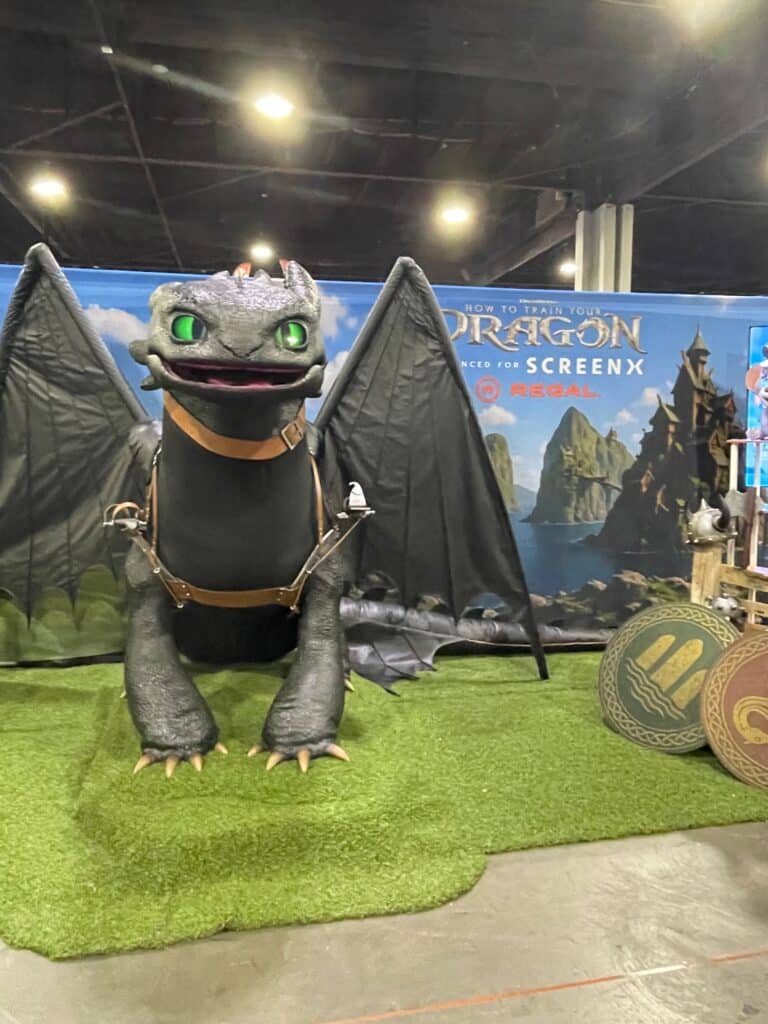


Workshops on everything from miniature painting and D&D to Gunpla modeling, as well as live performances and a massive vendor area and fan car showcase rounded out the exciting weekend.
Though tired from a whirlwind weekend of geek culture camaraderie and large (but super friendly) crowds, we can’t wait to see what MomoCon has in store for 2026.
For more about MomoCon, visit momocon.com.

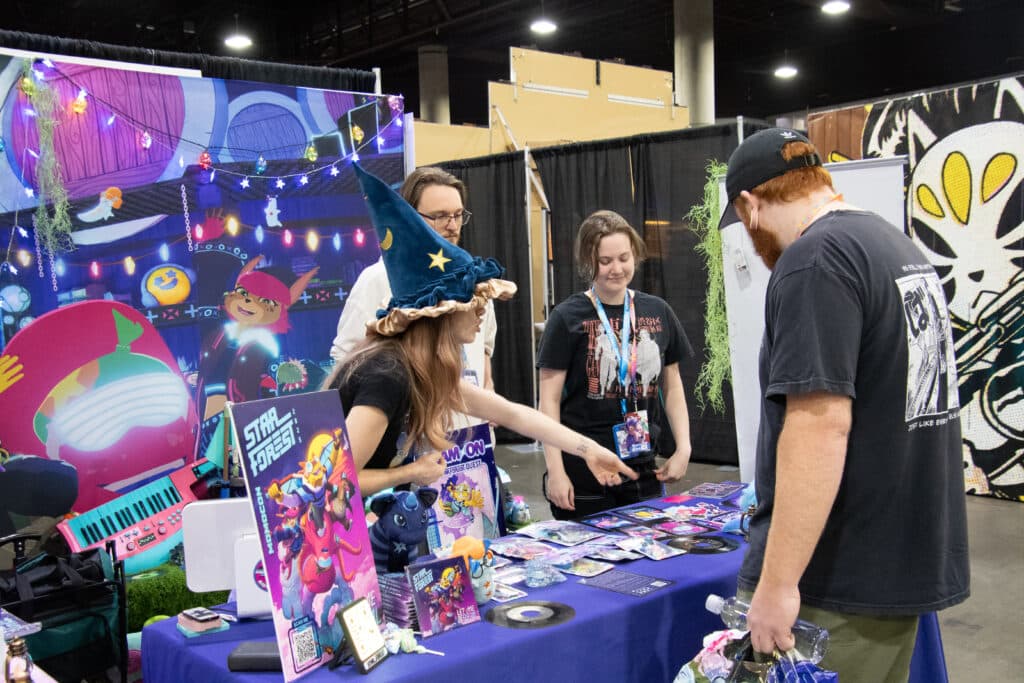





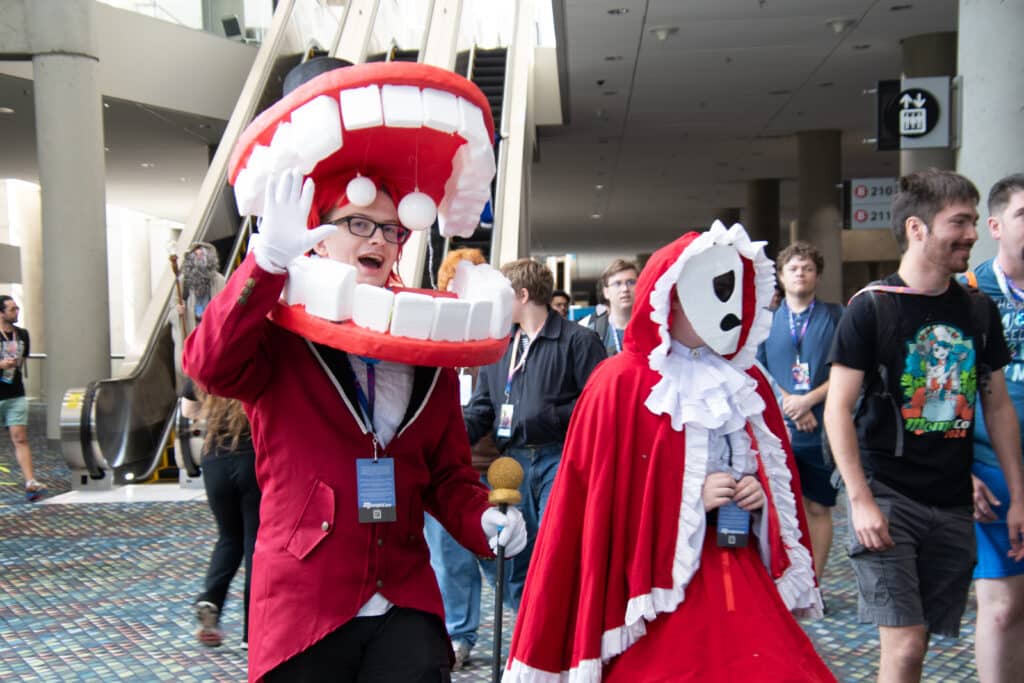


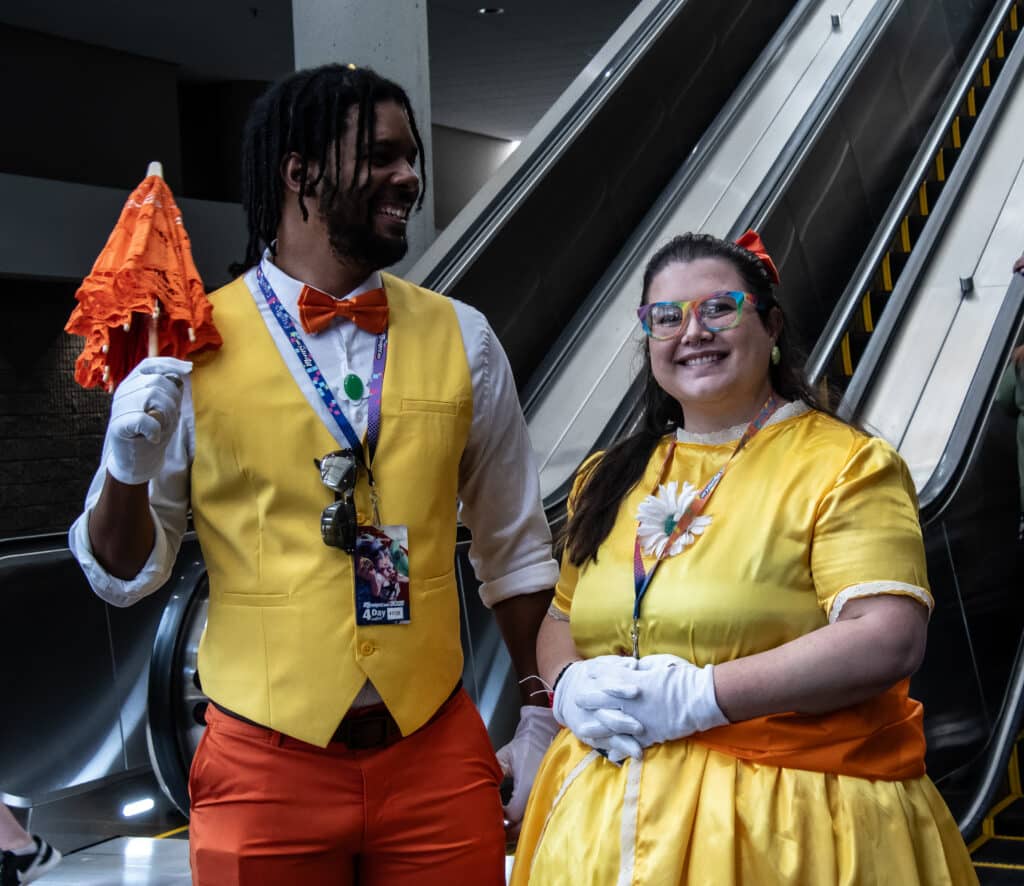

More moments from 2025; photos courtesy of MomoCon
Related
Read the Digital Edition
Subscribe
Keep Up With Peachtree Corners News
Join our mailing list to receive the latest news and updates from our team.
You have Successfully Subscribed!

Vox-Pop-Uli Launches RED Initiative for Veterans’ Support

From Zero to Accredited: Dunwoody’s Billy Grogan on Starting a City Police Department [Podcast]

City Collaborates with DNR for Deer Overpopulation Solutions

More Than Badges: Why Community Culture Drives Great Policing [Podcast]

The PCBA Awards $500 to Light Up The Corners at After-Hours Event

The City and PCBA Welcome Ride Lounge with Ribbon Cutting Ceremony

Peachtree Corners Festival Awards Debbie Mason Drama Scholarship for 2025

The Forum Welcomes [solidcore] with June 7 Grand Opening

Eric Christ: Upcoming Elections Update

The Forum Welcomes [solidcore] with June 7 Grand Opening

More Than Badges: Why Community Culture Drives Great Policing [Podcast]

The City and PCBA Welcome Ride Lounge with Ribbon Cutting Ceremony

From Zero to Accredited: Dunwoody’s Billy Grogan on Starting a City Police Department [Podcast]

Mustache The Band Set to Play the VoxStage on June 14

City Collaborates with DNR for Deer Overpopulation Solutions

Peachtree Corners Festival Awards Debbie Mason Drama Scholarship for 2025

Light up the Corners [Video]

Capitalist Sage: Business Leadership in Your Community [Podcast]

Cliff Bramble: A Culinary Adventure through Italy

Top 10 Brunch Places in Gwinnett County

A Hunger for Hospitality

THE CORNERS EPISODE 3 – BLAXICAN PART 1

Top 10 Indoor Things To Do This Winter

The ED Hour: What it takes to Remove Barriers from Education








